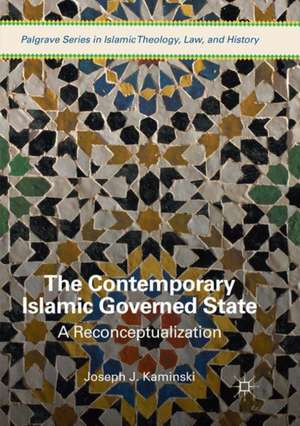The Contemporary Islamic Governed State: A Reconceptualization: Palgrave Series in Islamic Theology, Law, and History
Autor Joseph J. Kaminskien Limba Engleză Paperback – 7 aug 2018
Preț: 195.94 lei
Nou
Puncte Express: 294
Preț estimativ în valută:
37.49€ • 39.15$ • 31.03£
37.49€ • 39.15$ • 31.03£
Carte tipărită la comandă
Livrare economică 31 martie-07 aprilie
Preluare comenzi: 021 569.72.76
Specificații
ISBN-13: 9783319860565
ISBN-10: 3319860569
Pagini: 331
Ilustrații: XIII, 331 p. 1 illus.
Dimensiuni: 148 x 210 mm
Ediția:Softcover reprint of the original 1st ed. 2017
Editura: Springer International Publishing
Colecția Palgrave Macmillan
Seria Palgrave Series in Islamic Theology, Law, and History
Locul publicării:Cham, Switzerland
ISBN-10: 3319860569
Pagini: 331
Ilustrații: XIII, 331 p. 1 illus.
Dimensiuni: 148 x 210 mm
Ediția:Softcover reprint of the original 1st ed. 2017
Editura: Springer International Publishing
Colecția Palgrave Macmillan
Seria Palgrave Series in Islamic Theology, Law, and History
Locul publicării:Cham, Switzerland
Cuprins
1. Introduction: ‘Determining the basis for political discourse for the next generation’.- 2. The Trajectory of the Development of Islamic Thought—A Comparison between 2 Earlier and 2 Later Scholars.- 3. The Ontological Framing of this Model of a Contemporary Islamic Governed State.- 4. Considering Leadership and Laws in a Contemporary Islamic Governed State.- 5. Considering Bureaucracy and Democracy in a Contemporary Islamic Governed State.- 6. The Importance of Involving Women in the Political Apparatus of a Contemporary Islamic Governed State.- 7—Considering the Role of Economic Justice in a Contemporary Islamic Governed State.- 8. The Case of Turkey: Soft Power and Economic Growth.- 9. The Case of Egypt: Revolution, Counterrevolution, and a Return to Brutal Dictatorship.- 10.The Case of Tunisia: Pragmatism and Cooperation.- 11. The Case of Malaysia: Prioritizing Economic Growth and Modernization .- 12. Conclusion: Creating a New Discourse.
Recenzii
“In The Contemporary Islamic Governed State, Kaminski places his focus primarily upon the intersection of politics and Islam through the lens of discourse analysis. Invoking such essential western scholars as Ernesto Laclau and Michel Foucault, Kaminski acknowledges and affirms the importance of discourse and its concomitant relationship to multiple nodal points of power in developing a conceptual framework for a viable political model.” (Saeed A. Khan, Politics and Religion, Vol. 12 (1), March, 2019)
“A comprehensive summary of the discourse on Islamic political theory in relation to important Western political philosophical figures … . Kaminski’s book is a thematically wide-ranging project that engages with many fundamental legal-philosophical questions and how they can be evaluated in relation to more specific, concrete socio-political realities in many parts of the Muslim world today. … this makes it all the more valuable for readers with a more advanced understanding of the topic of Islam and its relation to politics.” (Translated from German, KISMET Online, September, 2018)
Notă biografică
Joseph J. Kaminski is an Assistant Professor at the International University of Sarajevo in Bosnia and Herzegovina. His research interests are at the intersection of political theory and international relations/comparative politics with a regional focus on the Muslim world.
Textul de pe ultima copertă
This book offers a normative reconceptualization of a modern Islamic governed state. First, Joseph Kaminski surveys the historical context of the trajectory of Islamic thought, and offers a unique discursive framework for reconceptualizing an Islamic governed state that rejects secular Enlightenment liberalism and instead is heavily grounded in Ancient Greek ideals of politics and political leadership. Despite heavily borrowing from Greek thought, the model offered remains firmly rooted in a Shari’ah-based, discursive ontological framework. The volume explores topics of bureaucracy, law, democracy, women in politics, and economic justice. Further, this volume presents case studies from Turkey, Egypt, Tunisia, and Malaysia, and utilizes the presented theoretical framework as a lens for analysis.
Caracteristici
Offers a critical normative exploration of the elements that are essential when conceptualizing a modern Islamic governed state Attempts to bridge the disconnect between theory and praxis when it comes to Islam and actual governance Written in a way to appeal to both experts and the general reading public who are interested in new approaches to the intersection of Islam and politics Includes supplementary material: sn.pub/extras Includes supplementary material: sn.pub/extras










